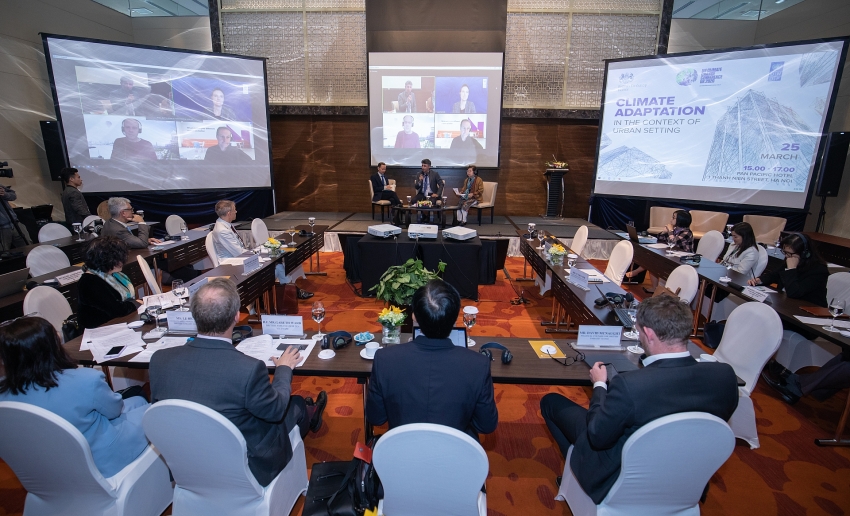Building climate change adaptation and resilience for cities of Vietnam
This workshop took place under the framework of the 26th United Nations Climate Change Conference (COP26), which will take place in November 2021.
 |
| The workshop highlights the needs for cities to apply solutions to respond to climate change |
The workshop aims to bring together different actors from the government, development partners, businesses, academia, youth, and local communities to discuss multiple aspects of urban resilience and climate change. It is an open platform for stakeholders to share information on specific challenges, benefits, best practices, and lessons learned on building urban resilience in Vietnam and the wider region. The workshop’s participants will explore and suggest ways forward on specific ideas for urban policy planning as well as actions required by relevant actors.
We are living in a world of cities, and that trend will continue in the future. Studies show that more than half of the world's human population has been living in cities since 2007, and urbanisation is calculated to rise to 80 per cent by 2050. In Vietnam, 76 cities accommodate 60 per cent of the total population and contribute to over 70 per cent of the GDP.
As cities continue to grow in population and infrastructure, they have to face several challenges – including housing, governance, urban mobility, and especially, the impacts of climate change. The increasingly variable trend of climatic conditions and its effects is adding pressure and uncertainties to urban areas. Vietnam’s 300 coastal cities are low-lying and frequently affected by natural disasters such as storms, floods, droughts, and saltwater intrusion. The costs of climate-induced disasters are climbing rapidly, taking an increasing toll on human life, assets, and livelihoods, as well as on valuable ecological systems.
Urban development that takes into consideration sustainable, climate-resilient measures will provide a safe and healthy environment for the city’s economic development and enhance the resilience of the residents. While urban resilience refers to reducing risks and damages from disasters and to the ability to quickly bounce back to a stable state, climate adaptation, and resilience measures have not been always intensively incorporated into urban planning and budgeting processes.
Speaking on the workshop, British Ambassador Gareth Ward said, “Studies show that adaption strategies integrated in land use planning can reduce cities’ vulnerability to the adverse impacts of climate change. Digitalisation plays an important role in this. The UK is contributing $135 million for five years until 2021 through UCCRTF (Urban Climate Change Resilience Trust Fund) to support fast-growing cities in Asia, including Vietnam, to reduce the risks poor and vulnerable people face from climate change impacts. COP26 presents a significant opportunity to raise global ambition on this theme of strengthening urban resilience.
"In the run-up to COP26, alongside with other development partners, we look forward to working further with the government of Vietnam in this important agenda,” he added.
Meanwhile, UNDP Deputy Resident Representative in Vietnam, Sitara Syed, also highlighted, “The overall efforts to reduce risk and adapt to the changing climate on a national scale must also incorporate the reduction of risk specifically in urban areas.”
Syed noted that most disaster-prone cities are unprepared either to handle future disasters or to reduce the associated risks. “Vietnam, as one of the countries most vulnerable to the impacts of climate change, is no exception. Cities are at the very forefront of climate change, both in terms of what is at stake and in terms of their potential to create meaningful and lasting change. If there is one key message which I would like you to take away from today, it’s that without prioritising urban resilience, we risk losing Vietnam’s development gains to disasters that could otherwise have been avoided.”
Echoing this view, Derek Murray, future cities smart technology and data advisor from Mott MacDonald also highlighted that a resilient city is one that operates in a smart way, focused on integrated and citizen-centric services, and prepared to respond to climate events through evidence-based decision making.
“The UK government’s Future Cities Programme works with cities across Southeast Asia to build capacity for resilience – in Ho Chi Minh City this includes flood resilience, where the programme supports digitalisation of the drainage network and provides technical assistance on data management and sharing between agencies,” Murray said. “As UK government delivery partner, Mott MacDonald brings data insights to help cities build long-term resilience and respond to climate extremes by bridging sector gaps and equipping communities, businesses and institutions with the awareness, knowledge, and capacity to prepare for the impacts of climate change.”
What the stars mean:
★ Poor ★ ★ Promising ★★★ Good ★★★★ Very good ★★★★★ Exceptional
Related Contents
Latest News
More News
- Japanese business outlook in Vietnam turns more optimistic (January 28, 2026 | 09:54)
- Foreign leaders extend congratulations to Party General Secretary To Lam (January 25, 2026 | 10:01)
- 14th National Party Congress wraps up with success (January 25, 2026 | 09:49)
- Congratulations from VFF Central Committee's int’l partners to 14th National Party Congress (January 25, 2026 | 09:46)
- 14th Party Central Committee unanimously elects To Lam as General Secretary (January 23, 2026 | 16:22)
- Worldwide congratulations underscore confidence in Vietnam’s 14th Party Congress (January 23, 2026 | 09:02)
- Political parties, organisations, int’l friends send congratulations to 14th National Party Congress (January 22, 2026 | 09:33)
- Press release on second working day of 14th National Party Congress (January 22, 2026 | 09:19)
- 14th National Party Congress: Japanese media highlight Vietnam’s growth targets (January 21, 2026 | 09:46)
- 14th National Party Congress: Driving force for Vietnam to continue renewal, innovation, breakthroughs (January 21, 2026 | 09:42)

 Tag:
Tag:

























 Mobile Version
Mobile Version